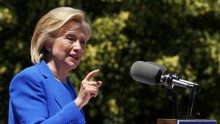US presidential candidate Hillary Clinton delivered her first major campaign speech on June 13. The observers note that it was not by accident that she chose as her venue a park commemorating the legendary Democratic president Franklin D. Roosevelt. In her speech, Clinton quoted current President Barack Obama, president Roosevelt, and her husband Bill Clinton. In her view, these three shared ideal that “real and lasting prosperity must be built by all and shared by all.”
Speaking to five thousands of supporters, she promised to act to support the poor and the middle class, that is, the social strata most affected by the recession. Clinton criticized the advantages provided to corporations in the American system. “Prosperity cannot be just for CEOs and hedge fund managers. America cannot succeed unless you succeed. That is why I am running for president of the United States,” the former first lady and former US secretary of state stressed.
The most applause came when 67-year-old Clinton said: “Well, I may not be the youngest candidate in this race. But I will be the youngest woman president in the history of the United States!”
Foreign policy issues took just several paragraphs in the 45-minute-long speech. In particular, the US presidential candidate assured that she had extensive experience in dealing with the most dangerous foreign policy challenges. According to her, no other country on Earth is “better equipped to meet traditional threats from countries like Russia, North Korea, and Iran – and to deal with the rise of new powers like China.”
“I have stood up to adversaries like Putin and reinforced allies like Israel. I was in the Situation Room on the day we got bin Laden,” Clinton remarked. Her words “I believe the future holds far more opportunities than threats if we exercise creative and confident leadership that enables us to shape global events rather than be shaped by them” were met with applause as well.
The Day asked American experts to comment on Clinton’s first campaign speech.
Steven PIFER, senior fellow at the Brookings Institution’s Center on the United States and Europe, Washington, D.C.:
“The bulk of Hillary Clinton’s June 13 speech focused on domestic issues. No surprise there: US presidential elections typically are decided much more on the basis of the economy and domestic questions than on foreign policy issues. This was Ms. Clinton’s kick-off speech; there will be plenty of discussions over the course of the campaign on foreign policy and national security.
“Ms. Clinton’s speech staked out a center-left position, again not a surprise. She wants to hold her Democratic Party base while positioning herself as the candidate for the center, particularly if the Republican primary campaign forces Republican candidates to stake out right-wing positions, as it may well do.
“My guess is that almost all candidates – Ms. Clinton and the vast majority of Republicans – will set out foreign policy lines that appear tougher than President Obama’s, though we will want to see detailed explanations of their views on specific questions. Ms. Clinton implemented the president’s ‘reset’ policy in 2009-10 and can argue that it yielded successes for US interests: the New START Treaty and Russian cooperation on blocking Iran’s nuclear program and on Afghanistan. But as Russian policy changed, which appears to have coincided with Vladimir Putin’s return to the presidency in 2012, Ms. Clinton appropriately toughened her line on Russia. As we saw last week with Jeb Bush’s speech in Berlin, a tough line on Russia will likely be standard in the run-up to the 2016 presidential vote.”
Dr. Matthew ROJANSKY, Director, Kennan Institute, Woodrow Wilson International Center for Scholars, Washington, D.C.:
“I don’t see anything new or dramatic in this speech. In fact every candidate on both sides in the 2016 race will say the same things. All will promise to be tough on Putin and strong supporters of the military and US Allies. A president’s foreign policy priorities need not become clear until s/he actually takes office, and is responsible not only for the rhetorical side of the policy, but also for the short- and long-term consequences of every action. That is why most presidents act with much more caution and restraint, and are in fact more similar to their predecessors, than campaign rhetoric would suggest.”








